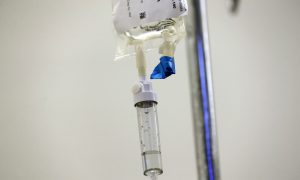Israeli Students Identify Compound to Prevent Hair Loss in Cancer Patients
Israeli biology students are researching a new way to prevent hair loss caused by chemotherapy in an effort to produce it on an industrial scale.Students at the Technion-Israel Institute of Technology have been attempting to synthetically produce decursin, a hair loss deterrent, with the hopes of incorporating it into products such as shampoos, creams, and more. The team aims to create special bacteria that will then produce decursin, which is also a major component of Angelica gigas Nakai root extract. Angelica gigas Nakai is a plant grown exclusively on the Korean Peninsula, and extracting decursin from it is an expensive and inefficient process, according to a statement by the school. However, decursin has many health benefits, including its ability to suppress inflammation, repress cancer, and prevent apoptosis—programmed cell death—including in hair follicles, according to researchers. The student team presented its plans for the pioneering technology at the International Genetically Engineered Machine (iGEM) competition in Paris last week, alongside hundreds of other teams from around the world. “We have now engineered three enzymes, contained in bacteria, which in turn produce a substance called decursinol, which can be turned into decursin,” Maia Lehrman, one of the students on the team, told The Times of Israel. “We want to be the first to mass produce decursin.” Hoping to ‘Help Many Cancer Patients’ Ultimately, the team won a gold medal for its work, according to a statement published by the university on Oct. 31. “It was amazing seeing our work being appreciated and seeing that everything we’ve been working on for the last six months is appreciated,” Lehrman told The Times of Israel. “We hope that this work will help many cancer patients facing hair loss.” Chemotherapy is one of the most common treatments for cancer and uses a special mixture of anti-cancer medicines that work to shrink or destroy cancer cells, according to the Centers for Disease Control and Prevention (CDC). However, chemotherapy also travels through the entire body, meaning it can cause damage to healthy cells as they go through their normal cell cycle, triggering issues like hair loss and other more severe side effects, such as deep vein thrombosis and neutropenia, a decrease in the number of white blood cells which help the body to fend off infections. In 2019, the most recent data year available from the CDC, about 1.8 million new cancer cases were reported and nearly 600,000 people died of cancer. Roughly 650,000 cancer patients receive chemotherapy in an outpatient oncology clinic in the United States each year. According to a model study published in The Lancet Oncology in 2019, the number of patients requiring primary treatment of chemotherapy will significantly increase annually between 2018 and 2040, jumping by 53 percent, from 9.8 million in 2018 to 15 million in 2040, which has the potential to create a major health crisis, according to researchers. Follow Katabella Roberts is a news writer for The Epoch Times, focusing primarily on the United States, world, and business news.

Israeli biology students are researching a new way to prevent hair loss caused by chemotherapy in an effort to produce it on an industrial scale.
Students at the Technion-Israel Institute of Technology have been attempting to synthetically produce decursin, a hair loss deterrent, with the hopes of incorporating it into products such as shampoos, creams, and more.
The team aims to create special bacteria that will then produce decursin, which is also a major component of Angelica gigas Nakai root extract. Angelica gigas Nakai is a plant grown exclusively on the Korean Peninsula, and extracting decursin from it is an expensive and inefficient process, according to a statement by the school.
However, decursin has many health benefits, including its ability to suppress inflammation, repress cancer, and prevent apoptosis—programmed cell death—including in hair follicles, according to researchers.
The student team presented its plans for the pioneering technology at the International Genetically Engineered Machine (iGEM) competition in Paris last week, alongside hundreds of other teams from around the world.
“We have now engineered three enzymes, contained in bacteria, which in turn produce a substance called decursinol, which can be turned into decursin,” Maia Lehrman, one of the students on the team, told The Times of Israel. “We want to be the first to mass produce decursin.”
Hoping to ‘Help Many Cancer Patients’
Ultimately, the team won a gold medal for its work, according to a statement published by the university on Oct. 31.
“It was amazing seeing our work being appreciated and seeing that everything we’ve been working on for the last six months is appreciated,” Lehrman told The Times of Israel. “We hope that this work will help many cancer patients facing hair loss.”
Chemotherapy is one of the most common treatments for cancer and uses a special mixture of anti-cancer medicines that work to shrink or destroy cancer cells, according to the Centers for Disease Control and Prevention (CDC).
However, chemotherapy also travels through the entire body, meaning it can cause damage to healthy cells as they go through their normal cell cycle, triggering issues like hair loss and other more severe side effects, such as deep vein thrombosis and neutropenia, a decrease in the number of white blood cells which help the body to fend off infections.
In 2019, the most recent data year available from the CDC, about 1.8 million new cancer cases were reported and nearly 600,000 people died of cancer. Roughly 650,000 cancer patients receive chemotherapy in an outpatient oncology clinic in the United States each year.
According to a model study published in The Lancet Oncology in 2019, the number of patients requiring primary treatment of chemotherapy will significantly increase annually between 2018 and 2040, jumping by 53 percent, from 9.8 million in 2018 to 15 million in 2040, which has the potential to create a major health crisis, according to researchers.












